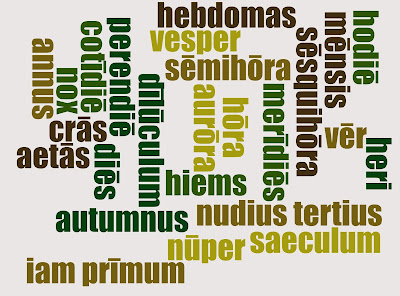[1] Vocabulary: nouns
[a] clock time
hōra, -ae [1/f]:
hour
sēmihōra, -ae
[1/f]: half an hour
sēsquihōra, -ae
[1/f]: hour and a half
[b] day; parts of
the day
aurōra, -ae [1/f]:
dawn; sunrise
dīlūculum, -ī
[2/n]: dawn; daybreak
merīdiēs, -ēī
[5/m]: midday
vesper, -ī [2/m],
or vesper, -is [3/m]: evening
nox, noctis [3/f]:
night
diēs, -ēī [5 m/f]:
day
hebdomas,
hebdomadis [3/f]: week; the most common word in Latin for ‘seven’ is septem
although this word could have that meaning, but it generally refers to a period
of seven days i.e. a week (Late Latin: septimāna, -ae [1/f]). We can ‘dig’ a
little because the word is originally from Anc. Gk. ἑβδομάς [hebdomás] ‘a group of seven’ (including days) < ἕβδομος [hébdomos] ‘seventh’ and ultimately from ἑπτά [heptá] ‘seven’ as in the Engl. deriv. heptagon
[c] seasons
vēr, -is [3/n]:
spring
aetās, aetātis
[3/f]: summer
autumnus, -ī
[2/m]: autumn
hiems, -is [3/f]:
winter
[d] months
[i] mēnsis, -is
[3/m]: month
[i] -ius e.g. Iānuārius,
-ī [2/m]
[ii] -er e.g. September,
Septembris [3/m]
[iii] Aprīlis, -is
[3/m]
[e] years
annus, -ī [2/m]:
year
saeculum, -ī [2/n]:
century
decennium, -ī [2/n]: decade (similarly quīnquennium,
triennium, biennium)
Notes:
nudius tertius
│ the day before yesterday; note the use of the ordinal number tertius
(third)
The literal
meaning of nudius is: ‘It is now the Xth day since ….’ i.e. Latin includes today in the calculation:
[1] today │ hodiē
> [2] yesterday │ heri > [3] day before yesterday │ nudius tertius
[it is now the third day]
This concept can
be extended:
Hēia, nūdius
quīntus nātus ille quidem est (Plautus) │ Why, indeed it is now the
fifth day since he was born.
nam [i] heri
et [ii] nudius tertius, ¦ quārtus, quīntus, sextus …
(Plautus) │ for [i] yesterday and [ii] the day before yesterday,
¦ (and) the day before that, and the day before that, and the day before that
[2] Vocabulary:
match the English words and expressions with the Latin in the word cloud
- autumn
- century
- dawn
- day
- day after tomorrow
- day before yesterday
- daybreak
- evening
- every day
- half an hour
- hour
- hour and a half
- midday
- month
- night
- only just
- recently
- spring
- summer
- today
- tomorrow
- week
- winter
- year
- yesterday
aetās; annus; aurōra; autumnus; cotīdiē; crās; diēs; dīlūculum; hebdomas; heri; hiems; hodiē; hōra; iam prīmum; mēnsis; merīdiēs; nox; nudius tertius; nūper; perendiē; saeculum; sēmihōra; sēsquihōra; vēr; vesper
[2] Phrases
Loquāmur dē [+
ablative] │ Let’s talk about …
Quid est …? │ What is …?
Quot sunt annī partēs? │ How many (parts
of the year) are there?
Quandō fuistī in scholā? │ When were you in
school?
Tempus quōmodo
dīviditur? │ How is time divided?
Ēnumerā (mihi) … │ Count (for me) …
Recēnsē (mihi) … │ Go over / review /
revise (for me) …
Recēnsē ōrdine.
│ Go over (them) in order.
Fac igitur. │ Do it, then / Therefore,
do (it)
Dīc minōrēs annī partēs. │ Say (the
smaller parts of the year)
Perge dīcere. │ Continue / carry on
saying (them).
Quattuor sciō.
│ I know four.
[3] Questions: can
you answer the questions of a 16th century school teacher? You can
see that the author designed them to provide one word or short phrase answers.
[i] Recēnsē mihi
quāsdam speciēs temporis.
[ii] Quot sunt
annī partēs? Ēnumerā mihi.
[iii] Annus quot
mēnsēs habet? Recēnsē ōrdine.
[iv] Dīc minōrēs
annī partēs.
[v] Quandō fuistī
in scholā? │ When were you in school? > Fuī … │ I was …
[vi] Quandō [i] mē [ii] tēcum dūcēs? │ When will you take [i] me [ii] with you? > [i] Tē [ii] mēcum dūcam … │ I will take [i] you [ii] with me …


No comments:
Post a Comment